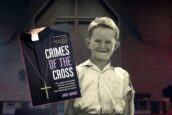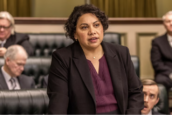
People of faith join Wall Street protests
As police helicopters hovered overhead, seminarian Rix Thorsell, wearing a clerical collar, marched on October 5 with other members of Brooklyn’s Greenpoint Reformed Church in a “Occupy Wall Street” protest that has captured national and international attention.
“Jesus stood with the 99 per cent [of society that is not wealthy],” said Thorsell, a student at New York’s Union Theological Seminary. “He didn’t support the establishment. He ate and lived among the poor.”
Thorsell and the members of his church and seminary were among people of faith who have joined the protests in lower Manhattan against what activists are calling “corporate greed” and growing economic inequity in the United States.
Some clergy, like their predecessors in the 1960s and 1970s who championed the cause of civil rights and protested the Vietnam War, are now taking to the streets to speak out and march at a time when the United States is facing its worse economic crisis since the Great Depression of the 1930s.
“As leaders of people of faith who are in the workforce and face the daily onslaught of this economy, I don’t think they can help but be involved,” Ken Estey, a Christian ethicist and union activist who teaches at Brooklyn College, told ENInews in an interview.
The 5 October march and rally that preceded it attracted tens of thousands and was generally peaceful, though it ended in the arrests of 23 people for what New York City police called disorderly conduct. Placards ranged from the mild — “Jobs not cuts” — to the more provocative, such as “Eat flaming death, fascist Wall Street pigs.”
Helen Schiff of New York City, a Jewish peace activist, handed out leaflets calling for an end to US military support for Israel because of Israeli government policy toward Palestinians.
But she said what united protesters was anger over economics. “The galvanising issue is that people are fed up with the collusion between Wall Street and the (US) government,” Schiff said. “They (the government) have been helping Wall Street and not the people, certainly not the working people.”
Among those joining the protests were members of Brooklyn Congregations United, a grass-roots interfaith group focused on assisting those facing bank foreclosures on their homes.
The Rev. Tom Martinez, a group member and an ordained United Church of Christ minister, said clergy and faith communities are involved in the protests for a number of reasons, including worries “about the growing and unchecked power of corporations.”
Such action is hardly unusual, Martinez told ENInews, citing the late Rev. Martin Luther King Jr, as an example of activist clergy.
“At their best, religious thinkers attempt to put their fingers on the pulse of their times, penetrating and challenging the reigning ideologies and critiquing them when they fall victim to the age-old sin of hubris,” he said. “The prophetic tradition has long been engaged in battling kings and tyrants.”
Protests are occurring throughout the United States, not just in New York, and in a October 5 statement, the Chicago-based Interfaith Worker Justice, a labor advocacy group with ties to religious communities, said it is supporting the activism.
“People of faith may not all agree with or even understand everything the Wall Street protesters are saying. But these protests are a teachable moment,” Kim Bobo, the group’s executive director, said in a statement. “They are giving congregations an opportunity to talk together about how we can help families hurt by this economy.”
Rabbi Michael Feinberg, who heads the Greater New York Labor-Religion Coalition, a group affiliated with Interfaith Worker Justice, said the occupation of Wall Street “is an important expression of popular anger about the way economic policy and the US economy are not working for most working people.”
By Chris Herlinger, Ecumenical News International




























































